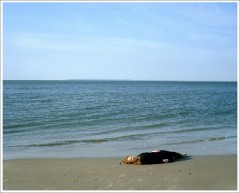Fiction James Brantingham — March 13, 2012 14:45 — 0 Comments
The Woman At The Bar – James Brantingham
The bar at the restaurant was busy. The gentleman asked the lady if he could sit in the chair next to her—the last chair to be found. She mouthed a quick ok—the kind of ok that says that she’d rather be kissed by a belching camel but that civility dictated politeness. He ordered a beer, careful not to look too long, or longingly, at the woman next to him. He did sneak a glance in her direction, though, when he asked to sit next to her. She was plain, no cover model for sure, but he did notice a sparkle in her eyes which spoke well of her, given her age. Being the polite sort he only said, “Thank you.†This bar was known as a safe place for a woman to have a drink in peace. He respected that.
He pulled a book from his briefcase and found his bookmark.
She took a quick glance at his reading material; she noticed that he was reading Dante—not the usual pub book bait.
“O, you who read…†she said, sotto voce, quoting from the Paradiso. As he turned to reply, he noticed that her complexion wasn’t really all that bad—a few wrinkles, but they were graceful wrinkles, the ignorable kind, the dim light in a dark room kind.
I’ll see you and raise you, he thought. So he then quoted a few lines from Chaucer: “Whan that Aprille with his shoures soote the droghte of Marche hath perced to the roote…†He rolled his ‘r’s just in case it mattered. She risked a slight smile. Not too many guys in a bar can pull that one off, she mused, as she decided not to make a big deal of his portly poundage.
She does have a pretty, though undecorated, smile.
“Ah,†she said, responding to Chaucer with a hearty “Hwæt! We Gardena in geardagumâ€â€”she pronounced the æsc carefully, in case it mattered. She saw his bet and raised it. He really wasn’t that bad looking—if you overlook the patchy gray hair and the sliding eyeglasses. And maybe even the crumpled tie. Wine does abet a lonely eye, especially when paired with literary motifs.
He was quiet for a moment in case the “Hwæt†was meant for him, which it turns out wasn’t. But he also did not want to be like Chretien’s “Knight of the Cart†who having hesitated a second before answering a request from a lady, ignominiously had to ride in the back of an old wooden cart. Being pilloried would have been no worse a punishment.
“You were about to say? Were you about to ask me something?
“If for I want that glib and oily art, to speak and propose not…†he said misusing Cordelia’s lines.
She thought for a moment, wrinkling her nose, then played her last card, “That’s “purpose not,†isn’t it?â€
“Let us go then, you and I…â€
The answer isn't poetry, but rather language
- Richard Kenney



